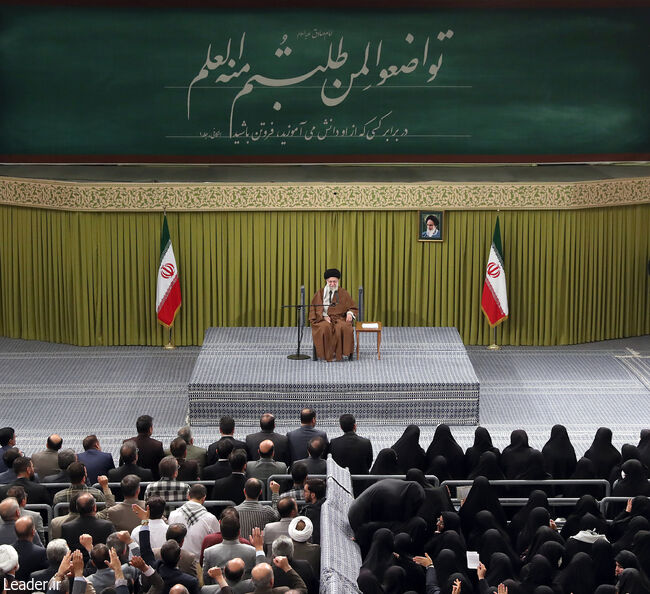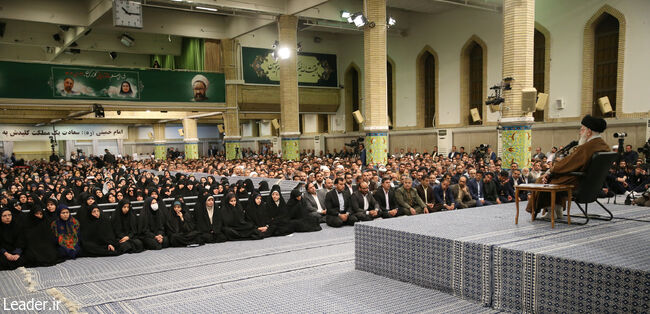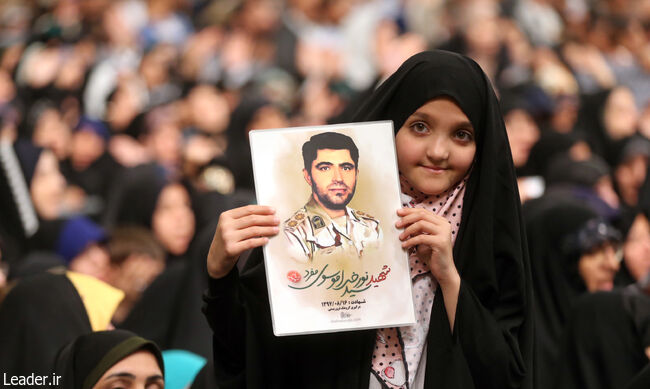On Teacher's Day, the Leader of the Islamic Revolution honoured and thanked teachers, which he saw as the duty of every individual in the nation. He pointed out that education is incomparable in importance and impact to any other system. He said, "Empowering the identity of the new generation, instilling enthusiasm and hope in them, continuously transforming, materially and non-materially empowering teachers, supporting teacher training centres, strengthening the Department of Education, and setting standards in the teaching community are the most important agendas in education."
Ayatollah Imam Khamenei also pointed to the rapid spread of demonstrations in the United States and other countries in support of the Palestinian people as a sign of the continuing priority of the Gaza issue in public opinion all over the world. He said, "The crimes of the Zionist regime and the collusion and support of the United States have confirmed the legitimacy of Iran's position in rejecting the occupying regime and its distrust of America. Everyone should know that there is no solution to the Palestinian issue other than the return of this land to its Muslim, Jewish, and Christian owners, and establishing relations and normalisation with the Zionist regime will not solve the problem."
He congratulated the esteemed community of teachers on Teacher's Day, recognising them as cultivators of virtue and builders of the country's future. He said, "Recognising and always showing respect for teachers by everyone leads to a greater attraction for this noble profession. It elevates the status of the teaching community, which advances the country. It is necessary for media and public platforms to actively participate in expounding on the position of teachers and emphasising the importance of praising them."
The Leader of the Revolution pointed out that education was more important than other institutions because it cultivated human resources. He said, "All institutions employ human resources, but education nurtures human resources."
Ayatollah Khamenei saw dynamic teachers as shapers of the young generation's identity. He said, "Every word, behaviour, position on issues, and even the gestures of a teacher influence the character-building of the new generation."
He regarded the availability of excellent human resources as vastly superior to that of natural resources and assets. He said, "Progress, security, health, knowledge, and the realisation of all human and Islamic values in the country depend on the presence of suitable human resources, which is a great task entrusted to education."
In the meeting, Ayatollah Khamenei praised the remarks of the Minister of Education. He said, "Thanks be to God, some of the points we have put forward in past years have been put into practice."
The Leader of the Islamic Revolution emphasised the implementation of the Transformation Document as the most important issue for education. He stated, "In the past few years, we have been passive and neglectful towards this document, but its revision and finalisation, along with the development of its implementation roadmap, is good news. The adjustments to the Transformation Document with the participation of domestic and international education experts must continue regularly."
"Empowerment" was the second topic that Ayatollah Khamenei addressed regarding the duties of education and training. He said, "We have always spoken about empowering teachers' livelihood and material resources. Now, every effort possible must be made to do this."
The Leader of the Revolution said, "Empowerment also has another dimension, which is strengthening the teaching profession; this means that the teacher should employ the forces of spirituality and love for education inherent in every human being, and by utilising its concomitants, needs, and experiences, fortify and stabilise the esteemed profession of teaching." In this very discussion, he mentioned that intention, spirit, motivation, and a genuine understanding of teaching are essential for nurturing the new generation. He said, "Teaching is not realised by mere classes and lecturing."
Ayatollah Imam Khamenei also saw improving teacher training centres as vital for getting the teaching community to a satisfactory level. He said, "Teacher training centres, including the Cultural University for Educators, must be thoroughly improved." The third topic that the Leader of the Revolution addressed was the importance and necessity of improving the Department of Education. He said: "At some point, some have argued that the Department of Education is unnecessary and that in addition to teaching, teachers can carry out the responsibility of training. This statement is correct, of course, but it's insufficient for teachers to pay attention to educational issues; an organised entity must be responsible for such an important matter."
Ayatollah Imam Khamenei considered one of the youth's expectations to be preventing the emergence and spread of social damage. He said, "The prerequisite and condition for achieving this important goal is that there should be no social damage within the schools themselves, which is a responsibility of the Department of Education."
Explaining the country's fundamental issues and the system to adolescents and young people was another duty of the Department of Education. The Leader of the Revolution referred to this, saying, "If millions of young people recognise the fundamental interests and issues of the country, if they are made aware of the fronts of friend and foe, and become vaccinated against the enemies' goals, the massive media and political investments of the enemies will not yield results."
Ayatollah Imam Khamenei added, "Students, young people, and adolescents must be aware of the logic and rationality behind the policies and behaviours of the system. They should understand the rationale behind the slogans, "Death to America" and "Death to Israel," and why Iran is not willing to establish relations with certain countries and governments."
Considering short-term managerial changes as obstacles to achieving fundamental tasks, the Leader stressed the importance of managerial stability in education. He said, "I emphasise that high to medium-level management should be stable enough to pursue important plans and tasks."
Referring to the existence of role models for various strata in different sectors of society, Ayatollah Khamenei emphasised the necessity of modelling and introducing exemplary teachers as a means of motivation. He said, "Education and training should identify successful role models such as teachers who teach effectively; those who have dedicated many years of their lives to teaching; or endure hardships teaching in challenging areas. These teachers should be introduced as champions in education and training."
In another part of his remarks, he stated his expectations from the teaching community. He said that the teacher was not only a disseminator of knowledge but also a nurturer of students' identities. He said, "The teacher can discover and actualise the potential abilities and talents of the students, like extracting gold and silver from a mine. Therefore, along with knowing about teaching, the teacher should also instil motivation, effort, self-confidence, and enthusiasm for learning and work in the students so that their internal capacities can flourish."
Another expectation of the educational system that the Leader mentioned was providing a national perspective to students. He said, "A national perspective means that students understand that education and the classroom are integral parts of the general movement towards progress. They are components of the great machinery advancing the country and the system. Therefore, it is necessary to make students aware of and take pride in national achievements, the country's assets, and victories resulting from taking the right approaches, as well as the dangers and enemies in their way."
He mentioned instilling hope as another duty of teachers, saying, "Hope is the guarantor of the country's future. Inspiring hope in the hearts and souls of the youth contributes to building the country's future; this is why we repeatedly insist on fostering hope."
Ayatollah Imam Khamenei criticised "Individuals who, out of stubbornness against the system, the government, or other individuals, make the youth hopeless and harm the country's future."
The Leader of the Revolution also recommended that teachers encourage students to participate in social activities and teach skills to students.
In the concluding part of his speech, Ayatollah Khamenei addressed the issue of Gaza. He said, "Despite the prodigious efforts of the Zionists and their American and European supporters, Gaza remains the leading issue in the world. There are protests against the crimes of the Zionist regime on American universities, which have expanded to universities in Europe. These are signs that public opinion continues to be sensitive on the issue of Gaza worldwide."
He saw the increasing pressure on public opinion against the occupying regime as essential. He said, "The savage and heartless behaviour of the Zionist regime's rabid dog has proved the righteousness of the stance of the Islamic Republic and the Iranian people. The massacre of thirty-some thousand people, half of whom are women and children, has revealed the evil nature of the Zionist regime and the unwavering stance of Iran to the whole world."
The Leader of the Islamic Revolution mentioned that another reason to justify Iran's negative view towards the US government was its response towards the non-violent, non-destructive student protests against Israeli crimes. It used all the means it had at its disposal against the students to destroy these protests. He said, "This issue showed everyone that America is an accomplice with the Zionists in the unforgivable crime of the massacre of the people of Gaza. Their seemingly sympathetic words are also lies. This proves the correct position of the Islamic Republic that they cannot be optimistic about the US government and cannot trust it."
Ayatollah Khamenei reiterated that the only solution to the Palestinian issue is the proposal put forward by Iran, which is the return of Palestine to its original owners, including Muslims, Christians, and Jews. He said, "As long as Palestine is not returned to its rightful owners, the problem of West Asia will not be resolved. Even if they try for another twenty or thirty years to sustain the Zionist regime—which, God willing, they cannot do—this issue is not solvable."
The Leader of the Revolution added, "Palestine must return to its people, and after the formation of a Palestinian government, they should decide what to do with the Zionists."
Speaking about moves towards normalising relations between the Zionist regime and neighbouring Arab countries in the region, he said, "Some people think that this will solve the problem. However, not only will the problem not be solved, but the problem will also affect the governments that have turned a blind eye to the crimes of the occupying regime and have shaken hands with it, and the people will rise against these governments."
At the beginning of the meeting, the Minister of Education, Mr. Sahraei, presented a report on the final stages of the revision process in the Transformation Document. He then announced the approval of the implementation roadmap for the Transformation Document, which focuses on teachers, curriculum and pedagogy, schools, and educational assessments, among other activities.
The unprecedented recruitment of 70,000 teachers, with a priority on hiring student teachers, the completion and construction of 2,900 schools nationwide, increasing the share of technical and vocational students in the second cycle of secondary education, pursuing the "every student, a vocational skill" policy, and enhancing educational and counselling affairs were some of the main points of the Minister of Education's report in this meeting.



